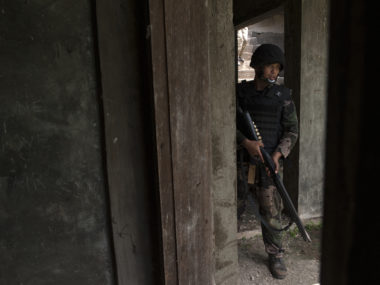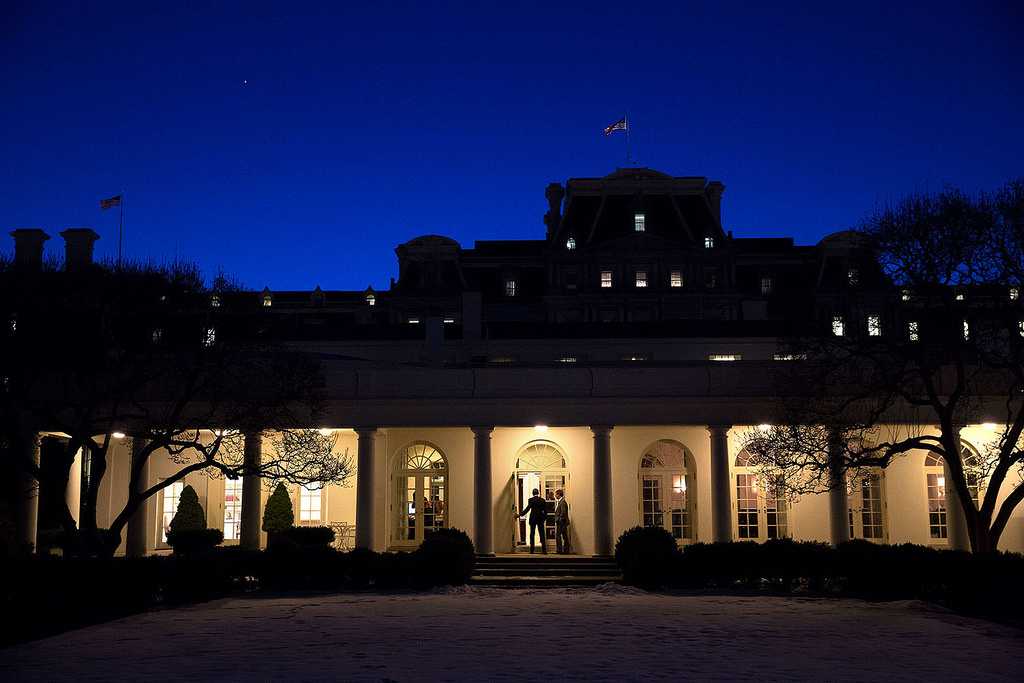Back in fall of 2010, after US Private Bradley Manning passed classified US Army logs to WikiLeaks, The Guardian published a story that began as follows:
“Fresh evidence that US soldiers handed over detainees to a notorious Iraqi torture squad has emerged in army logs published by WikiLeaks. The 400,000 field reports published by the whistleblowing website at the weekend contain an official account of deliberate threats by a military interrogator to turn his captive over to the Iraqi ‘Wolf Brigade’.”
Last Friday The Guardian published a series of articles summarizing over a year’s worth of their investigative reporting, conducted with BBC Arabic (here, here, and here). The Pentagon has launched an investigation in response.
What most interests me about this development is the possibility of trials: I think the chance of that just went from effectively zero to greater than 50 percent. Why?
First, credible witnesses place retired Colonel Jim Steele (US Army) at the scene of ongoing interrogations during which torture was taking place. The Guardian has found three US soldiers, one of whom is on the record, who provided such accounts, and two journalists corroborate. Here is an extended quotation:
[New York Times reporter Peter] Maass and photographer Gilles Peress gained a unique audience with Steele at a library-turned-detention-centre in Samarra. “What I heard is prisoners screaming all night long,” Peress said. “You know at which point you had a young US captain telling his soldiers, don’t, just don’t come near this.” …According to Maass in an interview for the investigation: “The interrogation centre was the only place in the mini green zone in Samarra that I was not allowed to visit. However, one day, Jim Steele said to me, ‘hey, they’ve just captured a Saudi jihadi. Would you like to interview him?’
“I’m taken not into the main area, the kind of main hall – although out the corner of my eye I can see that there were a lot of prisoners in there with their hands tied behind their backs – I was taken to a side office where the Saudi was brought in, and there was actually blood dripping down the side of this desk in the office.Peress picks up the story: “We were in a room in the library interviewing Steele and I look around and I see blood everywhere, you know. He (Steele) hears the scream from the other guy who’s being tortured as we speak, there’s the blood stains in the corner of the desk in front of him.”
Maass says: “And while this interview was going on with this Saudi with Jim Steele also in the room, there were these terrible screams, somebody shouting Allah Allah Allah. But it wasn’t kind of religious ecstasy or something like that, these were screams of pain and terror.”
Several former detainees and a former Iraqi General are also willing to testify.
Second, four non-legal (i.e., political) issues are relevant. First, Steele is notorious: he not only played a key role advising El Salvadoran units that tortured widely during the 1980s, Steele also operated an air field that was used during the covert operations exposed during the Iran-Contra scandal. Second, he was originally in Iraq because of his personal and professional relationship with Vice President Dick Cheney. Third, he initially served, as a civilian, as personal envoy to Secretary of Defense Donald Rumsfeld, and later was hired as a contractor and reported to General Patreus. Fourth, he is 68 years old: I have written elsewhere about the tendency for rights prosecutions to target those who live long, and thus have fewer of their supporters above ground to help bring political pressure to bear to defend them. None of those points is legally pertinent, but they are politically important.
To appreciate the importance of these issues, consider the literature on how courts construct power. To begin, note that courts have neither budgetary authority nor coercive capacity, yet they must rule against the branches of government that do (the executive and, in many countries, the legislature). A valuable line of work has developed by beginning with these facts to observe that what is odd is not the absence of powerful courts, but indeed, the existence of any: what needs to be explained is why any executive or legislature would ever obey an adverse ruling from a body as toothless as a court. Georg Vanberg, Cliff Carrubba, Gretchen Helmke, and Jeff Staton are among the leading scholars working in this area. The index card version of the theory in this work says that judges construct power slowly, over the years, by avoiding ruling adversely when the ruling is unlikely to garner support among members of civil society upon which the executive (or legislature) relies for retention of office.
The Obama administration entered office with a considerable legal problem on its hand: the incoming President was on record being opposed to the Bush Administration enhanced interrogation program policies, and had received considerable support during the campaign from retired US military officers who wanted the policies reversed. Would he direct the Department of Justice to investigate and bring charges, perhaps against senior administration officials such as Cheney or Rumsfeld?
Doing so would have been foolish politics in any era, much less the divisive political arena faced by the first non-white president in US history. If there were to be any legal challenge to the Bush administration’s “few bad apples” whitewash of the allegations that grew out of Abu Ghraib, Guantanamo, etc., Obama’s administration would need to limit it to low ranking officials and soldiers.
After three years of investigating the Department of Justice announced in August of 2012 that it was closing its investigation and would not be bringing any charges. This was prudent electoral politics: Mitt Romney’s campaign could have used a boost (ask Nate Silver). Indeed, in October I joked to several friends that Romney ought to phone Cheney, Rumsfeld, and Bush, imploring each to “take one for the team” and travel to Europe where they would risk arrest, thus placing Obama in a pickle with a nasty “October Surprise.”
As a brief aside, many folks do not seem to appreciate one manner in which the international human rights regime functions today. Several senior US officials are effectively “under house arrest within the United States,” particularly Cheney and Rumsfeld, but also Henry Kissinger — not one of them risks foreign travel as they recognize that they could well be caught in an extradition snare à la former Chilean dictator Augusto Pinochet. And while I am personally confident that the US government would succeed in getting them back home, à la Pinochet, none seems to be interested in playing such a martyr.
Return now to courts seeking to construct power and the possibility of trials for torture during the Bush years. Steele strikes me as a politically perfect candidate: he is directly linked to officials who a US President would have to defend; tainted by scandal; and has generationally passed his peak power. Further, from the bleachers there appears to be the credible evidence that a prosecutor requires. Does that mean the Pentagon investigation is likely to produce charges against Steele? I am too far removed from such investigations to hazard a reasonable guess. Yet should they fail to do so, there will be ample ground for prosecutorial efforts outside the US, and I would not rule out the ICC as a potential forum. Reports indicate that Steele has substantial corporate holdings outside of the United States and unlike Cheney, Rumsfeld and Kissinger, might find that “house arrest in the US” dents his life considerably. In fact, I suspect that as the investigation proceeds Steele will sell his companies and move back home.
Of course, these legal developments will move slowly, unfolding over many years. Those who wish to see courts slowly accumulate power vis-à-vis countries in the realm of human rights may want to raise a glass and toast Mr. Steele’s health, wishing him a long life.
@WilHMoo





0 comments
It’s not true that Kissinger is effectively “under house arrest within the United States.” I ran into him once in Paris, where he was in town, ironically, to award a peace prize. He was joined by Jacques Chirac.
Thanks for the correction!
The hyperlink doesn’t seem to have worked there. Here is a video of his speech: http://www.unesco.org/new/en/houphouet-boigny-peace-prize/award/prizewinners/2005-prizewinner/
Reblogged this on The Cosmopolite.